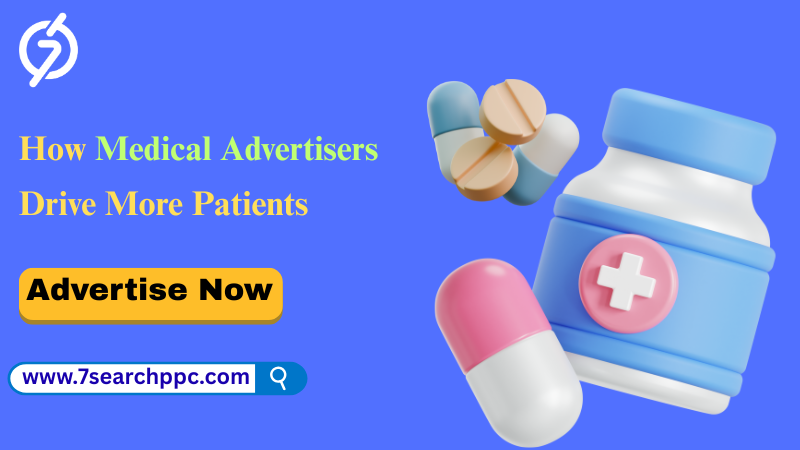Article -> Article Details
| Title | High-Converting Ad Strategies That Drive Patients for Medical Advertisers |
|---|---|
| Category | Fitness Health --> Health Articles |
| Meta Keywords | medical advertisers, |
| Owner | Smith English |
| Description | |
| Healthcare advertising is evolving fast. Patients no longer respond to plain clinic listings or generic medical ads. They expect relevance, clarity, and trust. This makes it essential for Medical Advertisers to focus on strategies that not only attract attention but also convert views into actual patients. Interestingly, more than 70 percent of patients start their healthcare journey online, yet only a fraction of campaigns succeed in turning those searches into bookings. If you want to dive deeper into the core challenges and opportunities in this field, Medical Advertisers can explore the guide Diagnosing Healthcare Advertising Challenges: The Prescription for Success, which highlights why some campaigns fail while others excel.
Why Conversions Matter More Than ClicksIn healthcare advertising, clicks don’t always mean success. A thousand clicks without appointments is simply wasted budget. What counts is conversions—turning those ad interactions into real patient actions such as booking consultations, calling the clinic, or signing up for treatment programs. This is where conversion-driven strategies separate smart advertisers from average ones. The Common Struggles in Medical AdvertisingMany medical advertising companies face the same challenge: ads that get impressions but fail to generate patient leads. Some reasons include:
In healthcare, the stakes are higher. A misleading ad isn’t just an inefficiency—it can harm patient trust, damage brand reputation, and even invite legal scrutiny. What Smart Medical Advertisers Do DifferentlyTop-performing advertisers treat each campaign like a patient consultation. They diagnose the problem, customize the solution, and ensure the approach builds long-term trust. Instead of selling treatments outright, they focus on guiding patients through decisions with useful, empathetic, and clear messaging. For instance, medical ads that feature real patient testimonials often outperform abstract claims because people trust relatable experiences. High-Converting Ad Strategies for Medical AdvertisersHere’s a detailed breakdown of strategies proven to convert clicks into patients: Leverage Precision Targeting Through Medical Ad NetworksOne of the biggest advantages today is the availability of specialized platforms. By choosing a medical ad network, advertisers can connect with highly relevant audiences—people already seeking healthcare solutions. This ensures ads reach potential patients instead of broad, uninterested users. Focus on Patient Pain Points, Not Just FeaturesPatients don’t click ads because of fancy medical jargon. They click when an ad addresses their fears, concerns, or needs. Instead of saying “We use advanced imaging,” a clinic could say, “Get fast, accurate results with same-day imaging appointments.” That solves a direct patient concern—waiting time. Create Ad Copy That Builds TrustTrust is the real currency in healthcare advertising. Use words that demonstrate credibility and avoid exaggerated claims. Strong ad copy often includes:
Optimize Landing Pages for ConversionsAds are only the first step. If a patient clicks and lands on a generic homepage, interest drops. Effective landing pages should:
Use Video Ads for Human ConnectionOne of the strongest medical advertising examples comes from clinics using video ads featuring doctors explaining treatments in simple language. These humanize the practice and boost engagement because patients feel like they are already meeting their doctor. Embrace Local Targeting and Geo AdsHealthcare is inherently local. Ads that emphasize proximity, such as “Orthopedic care in downtown Chicago,” see higher click-through and conversion rates. Local campaigns help patients trust that help is close by. A/B Test and Refine ContinuouslyTop advertisers don’t assume—they test. Create multiple versions of ads with different headlines, visuals, or CTAs. Analyze results and double down on what works. Small refinements can make major improvements in conversion rates. Highlight Accessibility and ConvenienceIn today’s market, patients value ease of access. Ads that highlight same-day appointments, online booking, or telemedicine options resonate strongly. These aren’t just features—they’re patient-focused benefits. Build Remarketing CampaignsNot all patients book on the first click. Remarketing keeps your practice visible to users who visited your site but didn’t convert. Gentle reminders through display or native ads can nudge patients back into the funnel. Ensure Compliance and Ethical StandardsEvery ad must comply with healthcare regulations. Avoid absolute guarantees or misleading claims. Instead, focus on transparency and educational value. Ethical advertising not only avoids penalties but also strengthens long-term credibility. Smarter Campaigns With StructureConversion success doesn’t come from luck—it comes from structured planning. Advertisers who map the patient journey, align ads with each stage, and choose specialized platforms outperform others. The process may feel overwhelming, but with the right frameworks and platforms designed for healthcare, the path becomes much smoother. Real-World Medical Advertising ExamplesHere are some success cases that highlight high-converting ad approaches:
These examples show that when ads align with patient priorities, conversion rates naturally rise. Time to Put Strategy Into ActionEvery day you wait, competitors capture patients online. It’s time to turn strategy into execution. Whether you start with one campaign or scale across multiple channels, the key is to launch, test, and refine. You can create an ad campaign today and see how structured strategies bring patient conversions to life. A Conversation Beyond AdsAt its core, healthcare advertising isn’t about sales—it’s about conversations. Patients don’t want to feel like customers; they want to feel understood. Ads that listen, guide, and reassure will always outperform ads that shout. So when you prepare your next campaign, remember: you’re not just promoting services, you’re extending trust. And trust is the foundation that converts clicks into care. Medical advertisers who adopt this mindset will always stay ahead—because while ads may win attention, empathy wins patients. | |

